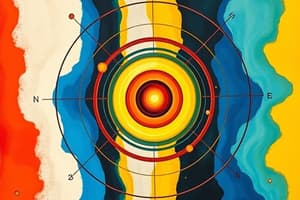Podcast
Questions and Answers
What does replication of a study involve?
What does replication of a study involve?
- Conducting a study multiple times to ensure consistent results. (correct)
- Conducting a study once and accepting the results as conclusive.
- Conducting a study without any changes.
- Conducting a study with modifications to obtain different results.
When a replication study differs from the initial study's results, what could that indicate?
When a replication study differs from the initial study's results, what could that indicate?
- The initial study was completely accurate in its findings.
- The replication study has flawed methodology.
- The results of either study could be due to chance and not be generally true. (correct)
- The replication study is always more reliable than the initial study.
What distinguishes a theory from phenomena?
What distinguishes a theory from phenomena?
- Phenomena are always grounded in empirical evidence.
- Phenomena are abstract concepts while theories are concrete observations.
- Theories are based solely on conjecture.
- Theories explain by including variables not observed directly. (correct)
How are theories understood in the scientific context compared to everyday language?
How are theories understood in the scientific context compared to everyday language?
What characterizes Zajonc’s theory of social facilitation and social inhibition?
What characterizes Zajonc’s theory of social facilitation and social inhibition?
How does the occurrence of phenomena relate to the establishment of theories?
How does the occurrence of phenomena relate to the establishment of theories?
What is a psychological phenomenon?
What is a psychological phenomenon?
Which phenomenon involves people recognizing faces of their own race more accurately?
Which phenomenon involves people recognizing faces of their own race more accurately?
What is the bystander effect?
What is the bystander effect?
Which phenomenon involves a conditioned response returning with no further training after time has passed?
Which phenomenon involves a conditioned response returning with no further training after time has passed?
What does the mere exposure effect refer to?
What does the mere exposure effect refer to?
What is the placebo effect?
What is the placebo effect?
What distinguishes a theory from an untested idea?
What distinguishes a theory from an untested idea?
How is a perspective different from a theory?
How is a perspective different from a theory?
What defines a model according to the text?
What defines a model according to the text?
In the context of theories, what is a hypothesis commonly used for?
In the context of theories, what is a hypothesis commonly used for?
Why is theory important in research studies?
Why is theory important in research studies?
What characteristic makes the 'germ theory' of disease a theory?
What characteristic makes the 'germ theory' of disease a theory?
What happens to a theory when a hypothesis is disconfirmed in a systematic empirical study?
What happens to a theory when a hypothesis is disconfirmed in a systematic empirical study?
Why do scientists tend to avoid using the word 'prove' when discussing theories?
Why do scientists tend to avoid using the word 'prove' when discussing theories?
According to the strictest version of the hypothetico-deductive method, what does disconfirming a hypothesis do to the theory?
According to the strictest version of the hypothetico-deductive method, what does disconfirming a hypothesis do to the theory?
Why do scientists not easily give up on their theories when faced with disconfirmed hypotheses?
Why do scientists not easily give up on their theories when faced with disconfirmed hypotheses?
What role do theories play in scientific research, based on the provided text?
What role do theories play in scientific research, based on the provided text?
How can understanding and using theories benefit a researcher, according to the text?
How can understanding and using theories benefit a researcher, according to the text?
What does the cognitive dissonance theory suggest?
What does the cognitive dissonance theory suggest?
What is subitizing in relation to quantitative ability?
What is subitizing in relation to quantitative ability?
Which theoretical approach explains psychological phenomena in terms of their function or purpose?
Which theoretical approach explains psychological phenomena in terms of their function or purpose?
What does the evolutionary psychology perspective assume about human behavior?
What does the evolutionary psychology perspective assume about human behavior?
Which theory focuses on specific variables, structures, and processes to explain psychological phenomena?
Which theory focuses on specific variables, structures, and processes to explain psychological phenomena?
What does subitizing refer to?
What does subitizing refer to?
Flashcards are hidden until you start studying




